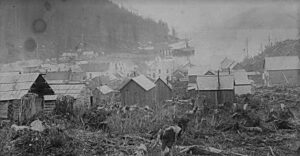- 1881

Juneau; view south over rooftops, ca. 1882. Alaska State Library, Edward DeGroff. Photographs, ca. 1886-1890, P91-65.
U.S. Navy Commander Rockwell arrived from Sitka to establish a military post to “preserve order” amongst the miners and Indians, but with little action, the post was closed in November. Gold mining in Silver Bow Basin and on Douglas Island, across the channel, proved very productive and the camp flourished with mercantile stores, service establishments, saloons, etc. springing up to provide all the necessary needs. On September 13, John Treadwell bought the “Parris” mining lode claim on Douglas Island from Pierre “French Pete” Erussard for a quit-claim deed of $5, plus up to $400 (estimates vary) to pay a pending freight bill Erussard needed for the next shipment of goods for his store. This claim Treadwell was soon able to develop into the eventual world class Treadwell mine. The first house in Douglas was log cabin reportedly built by William Newcomber, located west of the Treadwell claims although the area was not called Douglas until the mid-1880s..
By May, 150 whites and 450 Indians were reported on site by naval Commander Glass. Áak’w and T’aakú people migrated there with their respective villages springing up on either side of what was first called Pilzburg, then Fliptown, Harrisburg, Rockwell, and ultimately Juneau, to take advantage of economic opportunities there. Settlers began displacing Tlingit people from their lands and areas of traditional use. Going rate for indigenous workers was $1/day, usually for packing supplies to the mining claims.
The first political convention convened August 16 to call for the need for a form of government in Alaska and representation in Congress and the first election was held in Alaska September 5 to elect a delegate (who was not received by Congress late that year). By the end of 1881, the town had a code of local laws, a townsite survey, a Board of Public Safety, and a post office. The mining code was amended to close the mining season October 1, so that miners wouldn’t have to work their claims in the off-season in order to hold them. Heavy snowfall often precluded claim work into May or beyond. Regular monthly mail steamer service began the end of March, greatly reducing the cost of supplies.
